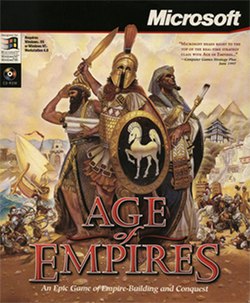Age of Empires (video game)
| Age of Empires | |
|---|---|

Windows Cover art
|
|
| Developer(s) | Ensemble Studios |
| Publisher(s) | Microsoft |
| Designer(s) | |
| Programmer(s) | Angelo Laudon |
| Artist(s) | Brad Crow |
| Composer(s) |
|
| Series | Age of Empires |
| Engine | Genie |
| Platform(s) | Microsoft Windows, Windows Mobile, Macintosh |
| Release date(s) | |
| Genre(s) | Real-time strategy |
| Mode(s) | Single-player, multiplayer |
| Aggregate scores | |
|---|---|
| Aggregator | Score |
| GameRankings | 87% |
| Metacritic | 83 |
| Review scores | |
| Publication | Score |
| AllGame | |
| CGW | |
| CVG | 9.0 |
| Game Revolution | B+ |
| GameSpot | 6.8 |
| IGN | 7 (Mac version) |
| PC Zone | 9.4 |
| PC Gameworld | 91% |
| Coming Soon Magazine | 90% |
| Game Vortex | 75% |
Age of Empires (AoE) is a history-based real-time strategy video game developed by Ensemble Studios and published by Microsoft. The game uses the Genie, a 2D sprite-based game engine. The game allows the user to act as the leader of an ancient civilization by advancing it through four ages (the Stone, Tool, Bronze, and Iron Ages), gaining access to new and improved units with each advance. It was later ported to Pocket PCs with Windows, resulting in a version very similar to the PC game.
Originally touted as Civilization meets Warcraft, some reviewers felt that the game failed to live up to these expectations when it was released. Despite this, it received generally good reviews, and an expansion pack, titled The Rise of Rome, was released in 1998. Both the original Age of Empires and the expansion pack were later released as "The Gold Edition". A sequel, Age of Empires II, was released in 1999.
Age of Empires requires the player to develop a civilization from a handful of hunter-gatherers to an expansive Iron Age Empire. To assure victory, the player must gather resources in order to pay for new units, buildings and more advanced technology. Resources must also be preserved, as no new resources become available as the game progresses, for example, trees that are cut down will not grow back.
Twelve civilizations are available. Each with individual sets of attributes, including a varying number of available technologies and units. Each civilization has technologies unique to them, so that no civilization possesses all the technologies possible within the game.
...
Wikipedia
